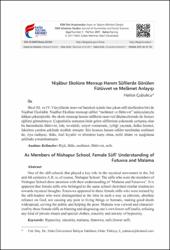| dc.contributor.author | Çubukçu, Hatice | |
| dc.date.accessioned | 2017-07-04T07:18:35Z | |
| dc.date.available | 2017-07-04T07:18:35Z | |
| dc.date.issued | 2017 | |
| dc.identifier.citation | ÇUBUKÇU, Hatice. "Nişabur Ekolüne Mensup Hanım Sufilerde Görülen Fütüvvet ve Melamet Anlayışı." FSM İlmî Araştırmalar İnsan ve Toplum Bilimleri Dergisi, 9 (2017): 97-115. | en_US |
| dc.identifier.uri | http://dergi.fsm.edu.tr/index.php/ia/article/view/793/793 | |
| dc.identifier.uri | https://hdl.handle.net/11352/2509 | |
| dc.description.abstract | Hicrî III. ve IV. Yüzyıllarda tasavvuf hareketi içinde öne çıkan sûfî ekollerden biri de
Nişâbur Ekolüdür. Nişâbur Ekolüne mensup sûfiler “melâmet ve fütüvvet” anlayışlarıyla
dikkat çekmişlerdir. Bu ekole mensup hanım sûfîlerin tasavvuf düşüncelerinde de benzer
eğilimi görmekteyiz. Çoğunlukla zamanın önde gelen sûfîlerinin yakınında yetişmiş olan
bu hanımlarda fütüvvet; îsâr, tevekkül, eziyet vermemek, iyiliği yaymak, halka hizmet,
fakirlere yardım şeklinde tezâhür etmiştir. Söz konusu hanım sûfiler tarafından melâmet
de; riya endişesi, ihlâs, özel kıyafet ve törenlere karşı olma, nefsi ithâm ve aşağılama
şeklinde yorumlanmıştır. | en_US |
| dc.description.abstract | One of the sûfî-schools that played a key role in the mystical movemnet in the 3rd
and 4th centuries A.H. is, of course, Nishapur School. The sûfîs who were the members of
Nishapur School drew attention with their understanding of ‘Malama and Futuwwa’. It is
apparent that female sûfîs who belonged to the same school cherished similar tendencies
towards mystical thoughts. Futuwwa appeared in these female sûfîs who were trained by
the sûfî-leaders who were distinguished at the time in such a way as altruism, absolute
reliance on God, not causing any pain to living things or humans, making good deeds
widespread, serving the public and helping the poor. Malama was viewed and characterized
by these female sûfîs as blaming and disgracing one’s own lower-self (nafs), refusing
any kind of pirvate rituals and special clothes, sincerity and anxiety of hypocrisy. | en_US |
| dc.language.iso | tur | en_US |
| dc.publisher | FSM Vakıf Üniversitesi | en_US |
| dc.rights | info:eu-repo/semantics/openAccess | en_US |
| dc.subject | Riya | en_US |
| dc.subject | İhlas | en_US |
| dc.subject | Melamet | en_US |
| dc.subject | Fütüvvet | en_US |
| dc.subject | Nefs | en_US |
| dc.subject | Hypocricy | en_US |
| dc.subject | Sincerity | en_US |
| dc.subject | Malama | en_US |
| dc.subject | Futuwwa | en_US |
| dc.subject | Nafs (lower self) | en_US |
| dc.title | Nişabur Ekolüne Mensup Hanım Sufilerde Görülen Fütüvvet ve Melamet Anlayışı | en_US |
| dc.title.alternative | As Members of Nishapur School, Female Sûfî’ Understanding of Futuvva and Malama | en_US |
| dc.type | article | en_US |
| dc.contributor.department | FSM Vakıf Üniversitesi, FSM İlmî Araştırmalar İnsan ve Toplum Bilimleri Dergisi | en_US |
| dc.relation.publicationcategory | Makale - Ulusal Hakemli Dergi - Kurum Öğretim Elemanı | en_US |



















